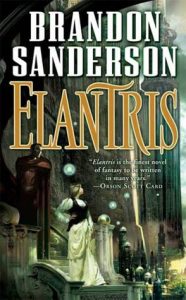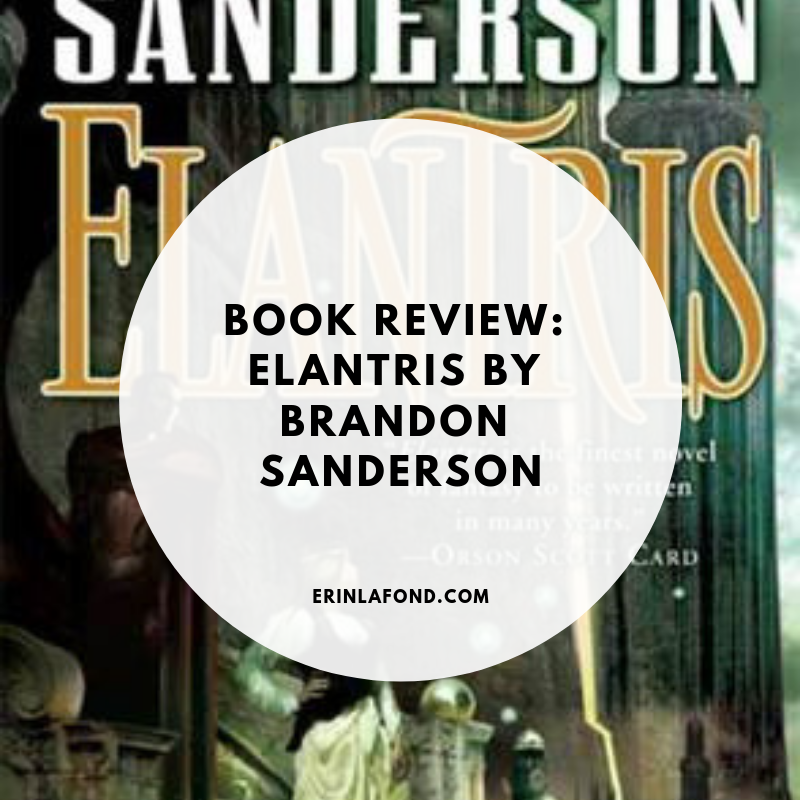Book Review: Elantris by Brandon Sanderson
Last updated on November 23rd, 2022 at 07:29 am
I recently finished Elantris by Brandon Sanderson. The novel was originally published in 2005, and it is his debut. To be honest, I’m not sure how I feel about this book. I had to take a few days to try and process my thoughts. I’m still not quite sure.
I’m going to do something I don’t normally do which is do my best to avoid spoilers.
The famed city of Elantris used to belong to basically gods with the power to wield the Dor which can do everything from heal to produce light. Anyone can be struck by the Transformation which turns them into an Elantrian. Then, everything goes wrong, and the Transformation starts turning people into beings who are virtually dead. The merchants take over, and new religions take hold in the surrounding city of Arelon. The novel revolves around three characters: Raoden, Sarene, and Hrathen. Raoden is the prince of Arelon who is suddenly struck by the Transformation and shoved into the dead city of Elantris. He wants to uncover the mystery of why Elantris changed overnight. Sarene is his widow who arrives at her wedding to find out that he’s dead. She has to survive the tense political climate of Arelon. Hrathen is a priest who has been tasked with converting Arelon to his religion before his leader destroys the entire city.
The novel is definitely interesting. The prologue is one of the best I’ve ever read. It’s immediately engaging. The writing is good enough that I was never pulled out of the story by awkward language. If I’m being honest, as easy as it was to start this book, I struggled to finish it. There were enough mysteries to keep me intrigued, but I had to make myself keep reading at points. With only the last sixth of the book left, I got bored. That’s like the worst place to get bored in a novel because, at that point, the conflict has escalated, and you should be desperate to know the ending. Yet, I had to force myself to get to Part Three where all the final action happens.
Normally, I love political novels, and this novel has a lot of politics. It’s basically a slow chess game with some magic and a mystery thrown in. The game feels believable, and you understand the motivations of all of the characters. The main characters are dimensional enough that each has their own personality, and you can become invested in them. Some characters, primarily the antagonists, felt a little cartoonish. However, there was enough going on that I could go along with them if that makes sense.
My biggest issue with this novel is Sarene. Part of me likes her. She’s incredibly smart, and you can see why the lords follow her lead. However, she feels a bit like a damsel in distress. She’s constantly being saved by the other lords despite an entire side plot where she teaches women how to sword fight. She’s a good fighter, but she can’t seem to defend herself. All the men around her defend her instead. She’s also obsessed with marriage and insecure about her own intelligence. For most of the novel, she seems to hate that her intelligence makes it difficult for her to get married. On some level, I get it. She wants companionship. Who doesn’t want that? But the novel takes it a little too far where it begins to feel like marriage defines her. Her big success at the end of the novel feels like her marriage even though it should be her political accomplishments. Raoden and Hrathen have much more satisfying endings.
There’s also a minor point within the novel that bothered me quite a bit. Okay, so, there are these beings in Elantris called Seons, and they’re slaves. They follow orders and can be passed down after their Master dies. But the book tries to convince you that they are not slaves by telling you that they enjoy being slaves. There’s this part in the novel where Raoden tries to tell his Seon that he is the slave, and his Seon is like:
“I want to serve, young master…My freedom is to be here, with you…You see rank and distinction; you try to order the world so that everything has a place either above you or beneath you. To a Seon, there is no above or beneath, there are only those we love. And we serve those we love…My payment is that of a father’s pride and a mother’s love. My wages come from the satisfaction of seeing you grow.” (211)
The idea of slaves that have chosen to be slaves is problematic. More than that, Seons are supposedly connected to Domi, or God. I interpreted that as it is basically their God-given nature to serve. I kept waiting for an Ood-style plotline like in Doctor Who. My issue is that the novel frames this as acceptable. The narrative doesn’t seem to have a problem with the fact that these beings choose to serve. This is the only moment of pushback we get, and it is immediately resolved. Raoden is convinced by this argument.
Overall, I’m happy that I’ve read Elantris, but I’m not sure I’ll continue reading the series when the new books come out. I would encourage you to read the novel and form your own opinion because it is a complicated book.
//
Sanderson, Brandon. Elantris. Tor Fantasy, 2006.

